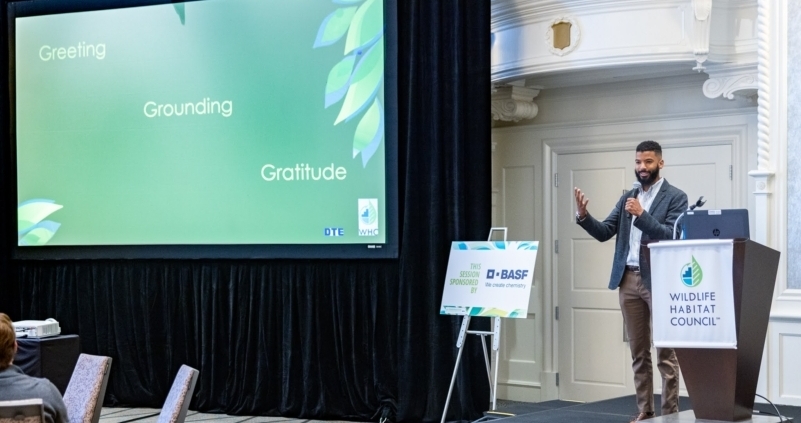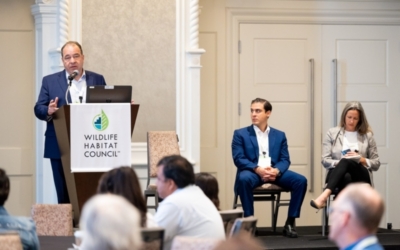Restoring Eden in our Communities with Edible Forests – A Conservation Conference Recap
On June 14-15, WHC welcomed over 400 attendees to our first in-person WHC Conservation Conference since 2019, and our first-ever conference held in Detroit, Michigan. During these two days, sustainability and conservation professionals shared their expertise on topics ranging from climate resiliency and remediation to environmental education and stakeholder engagement.
Naim Edwards kicked off the Conference with a session at the start of Day One. Edwards serves as the Director of MSU-Detroit Partnership for Food Learning and Innovation (DPFLI), Detroit’s first urban agriculture research center.
Edwards opened his session with the example of Zaruma, El Oro in Ecuador, where local fruits grow along the streets and in parks. In particular, Edwards noted that fruit is always freely accessible and affordable to buy at the market, tying this into the concept of food sovereignty. Food sovereignty, Edwards explains, is “the power to determine how food is grown and accessed.” He remarked that, even despite poverty in Zaruma, food sovereignty means that locals can still access and afford food.
Looking back to the U.S., Edwards recognized a separation between communities and food production. “A part of the issue historically with agriculture is throughout the 20th century, it became very industrial,” Edwards said in a video about the DPFLI, “and that played a role in separating people from even knowing how food grows and where it comes from.”
This separation is not only metaphorical, but physical as well. About 19 million Americans live in a food desert, where lack of access to a car or nearby supermarket cuts them off from healthy and affordable food. On this subject, Edwards suggested a change in language use — rather than the term “food desert,” which can give a negative connotation to deserts and ignores the fact that many foods thrive in deserts, Edwards recommends using the phrase “food apartheid.” This shift helps place a focus on the discriminatory policies and structures that have historically kept marginalized populations from accessing healthy food.
With food insecurity a growing problem worldwide, Edwards turned to the solution of growing food in our own neighborhoods. He focused specifically on Michigan, which, he explained, is the second most agriculturally diverse state in the country. Michigan’s climate and soil create an ideal environment for fruits such as apples, pears, berries and even figs as well as nuts like almonds, pecans and hazelnuts – all components of a healthy diet. Edwards also shared about foods that are typically difficult to find in stores, such as pawpaws, which makes the ability to grow them at home even more valuable.
So how can food sovereignty address the issue of food apartheid?
Edwards suggests the answer lies in edible communities. Edible forests, like the Fargo Forest Garden in Portland, Oregon or the Cascadia College Food Forest in Bothell, Washington, provide crops, typically fruit and nut trees, that community members are encouraged to pick. These forests are designed to grow without the use of pesticides or maintenance like mowing or weeding.
The benefits of edible forests and communities are far-reaching – not only do they provide bountiful food for local residents, but they also help reduce poverty by creating jobs. Ecologically speaking, edible forests have a wide range of positive impacts, from sequestering carbon and managing stormwater runoff to regulating the climate and enhancing biodiversity.
When starting an initiative like an edible forest that requires involvement of the community, Edwards recommends taking into account the knowledge of community members. “Often times,” he says, “we may enter spaces with the intention of teaching and ‘showing’ people a way. We may not recognize that they already know and have ways and solutions to conservation problems.” Sharing knowledge and developing community-driven solutions helps build strong relationships between conservation professionals and the local community.
“I felt the session was well received by the audience,” said Edwards when asked about Conference attendees’ reactions to the ideas he presented. “I hope the audience realized how intentionally most Americans have been systematically removed from experiencing how food is cultivated, and I hope they learned about fruits and nuts that are typically unavailable for purchase in stores.” As he showed in this session, edible forestry is one agricultural strategy rooted in food sovereignty that can restore our connections to nature and food while protecting the environment.
Naim Edwards earned his master’s degree in science from the University of Michigan before moving to Detroit, where he now works to connect the urban agricultural community with research opportunities. The goal of the DPFLI is to conduct urban agriculture research while engaging with the people of Detroit by providing programs, mentorship, outdoor recreation and more. Follow the MSU Extension on Twitter and connect with Naim Edwards on LinkedIn. To learn more about the DPFLI, visit https://www.canr.msu.edu/detroitpartnership/


